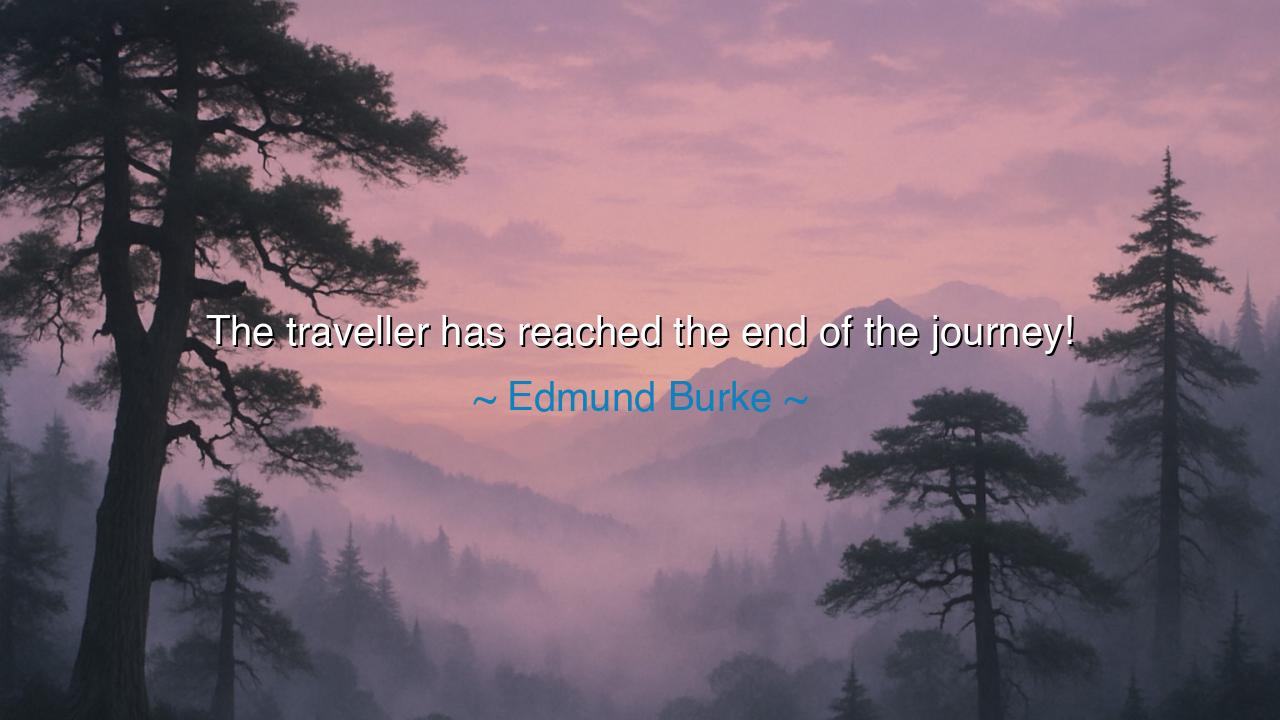
The traveller has reached the end of the journey!






Hear the solemn cry of Edmund Burke: “The traveller has reached the end of the journey!” Though brief, these words carry the weight of finality, the hush of endings, and the dignity of a life brought to its close. They are not mere description, but a pronouncement filled with reverence: for the life of man is itself a journey, and to speak of its end is to speak of death, not as annihilation, but as the final resting place of one who has walked long and far upon the road of existence.
The image of the traveller is one beloved of the ancients. To live is to wander from dawn to dusk, from birth to the grave, passing through valleys of joy and mountains of sorrow. Each soul, whether great or small, is a wanderer along this path, gathering experiences as one might gather stones or flowers by the roadside. When Burke proclaims that the journey has ended, he invites us to see death not as a void, but as the conclusion of a pilgrimage, the final destination that all mortals must reach.
Consider the great Odysseus, who after years of war and wandering at last set foot upon the shores of Ithaca. His voyage was filled with storms, monsters, temptations, and trials, yet the end of his road was homecoming. So too is the end of life: a homecoming, whether to the earth that bore us, or to the realm beyond where the soul finds its rest. The metaphor of the traveller grants death a meaning greater than silence—it becomes fulfillment, the sealing of a story long in the telling.
Burke himself, philosopher and statesman, lived in an age when the fragility of life was ever present, when friends and rivals alike fell to disease or war. To speak thus of the end of the journey was both acknowledgment and comfort. For in the tumult of politics, in the roar of revolution, in the collapse of empires, he reminded his hearers that all human striving flows toward one certain conclusion. The road may twist in cruelty or in triumph, but its end is shared by all.
We may recall too the life of Marcus Aurelius, the Stoic emperor, who often reflected that each man is a soldier stationed on earth for a time, dismissed at the appointed hour. To him, death was not tragedy, but release—“the traveller has reached the end.” In such teachings, we see the wisdom of those who accepted mortality not with fear, but with dignity, finding in it the natural close of the journey appointed by Providence.
The lesson for us is this: do not live as though the road has no end. Each step carries us closer to the closing of the path. Let us walk, then, with purpose, with kindness, and with courage, so that when our own journey ends, we may look upon it not with regret, but with gratitude. To remember the end is to live more fully in the present, to value each sunrise as part of a journey that is both fleeting and precious.
Practically, this means: do not delay in loving those around you. Do not postpone the good you might do, or the dream you might pursue. The traveller knows not how many miles remain before the road fades into the horizon. Live as one who knows the journey is sacred, not endless. Keep your affairs in order, your heart in peace, your steps in alignment with what you know to be just and true.
Therefore, O children of tomorrow, remember Burke’s proclamation. The traveller in each of us will, in time, reach the end of the journey. Let it not come upon you as a thief, but as a long-expected guest. And when that moment arrives, may your road behind you be filled with deeds of honor, love given freely, and wisdom shared generously. For the journey is brief, but the way it is walked makes it eternal.






AAdministratorAdministrator
Welcome, honored guests. Please leave a comment, we will respond soon